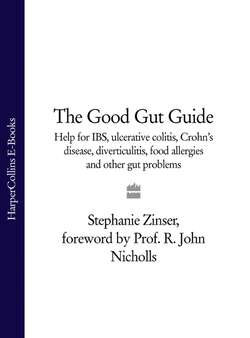Читать книгу The Good Gut Guide: Help for IBS, Ulcerative Colitis, Crohn's Disease, Diverticulitis, Food Allergies and Other Gut Problems - Stephanie Zinser - Страница 39
Wind and Bloating
ОглавлениеThere are two major ways in which we produce gas. Firstly, we swallow air when we eat. Some people swallow more than others and certain foods (for example, aerated drinks) also contribute to this. Some people swallow air as a nervous reaction – called ‘aerophagy’ – and this can cause quite severe wind problems from both ends. Secondly, wind is a by-product of food digestion. Fats and proteins cause little gas, but carbohydrates (vegetables, beans, pulses, fruit, whole grains), sugars, dairy products and foods that contain sorbitol (often found in sugar-free items) all produce gas as they are digested. Lactose intolerance can also cause a lot of uncomfortable wind.
The digestive tract, in particular the large intestine, contains billions of bacteria – each of us has about 1 kilogram (21b) in our body. Some of these, like various strains of lactobacilli and bifidobacteria, are very good for gut health. They benefit from the food that passes through our gut, while we benefit from their by-products – vitamins and other chemicals they produce, as well as the stimulation our immune systems need to function optimally. These ‘good’ bugs also keep potentially harmful bacteria such as the Escherischia (like E. coli) and Streptococci strains in check.
Contrary to popular belief, intestinal bacteria don’t tend to create much gas as a by-product. In fact, they mostly consume it. Professor Glenn Gibson, a leading British researcher of gut flora, says that without bacteria, the average person would produce about 25 litres of gas every day. Thankfully, intestinal bacteria reduce this to approximately 5 litres. That’s roughly 20–30 farts a day. Anyone who claims they don’t break that much wind is either mistaken, doing it in their sleep – or lying! If you think 5 litres is bad enough, spare a thought for anyone suffering from the exceedingly rare disorder pneumatosis cystoides intestinalis; they have no intestinal bacteria to reduce the overall gas load and as a consequence they do produce around 25 litres of wind every day.
Bloating is often a consequence of wind – but not always. It can be the result of a sluggish bowel and come from feelings of fullness, perhaps due to constipation or overeating. A full bladder, water retention or pregnancy can also cause bloating. In some people, a high-fibre diet can cause bloating, while in others it may relieve it. Wind and bloating are also associated with moderately troublesome conditions like gastritis, IBS, malabsorption and parasitic infections.
Bloating occasionally indicates serious abdominal problems like bowel tumours or Crohn’s disease, and two rare emergency conditions, peritonitis and intestinal obstruction. However, in these cases bloating will virtually always be accompanied by other serious symptoms – acute pain, diarrhoea, bleeding and so on.
